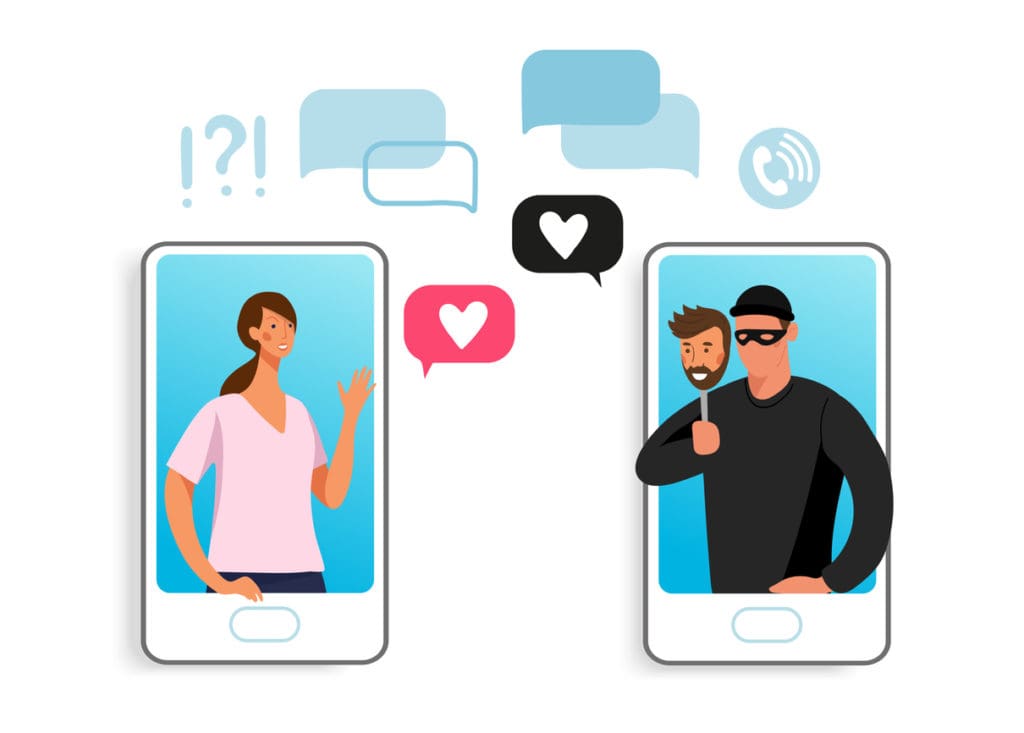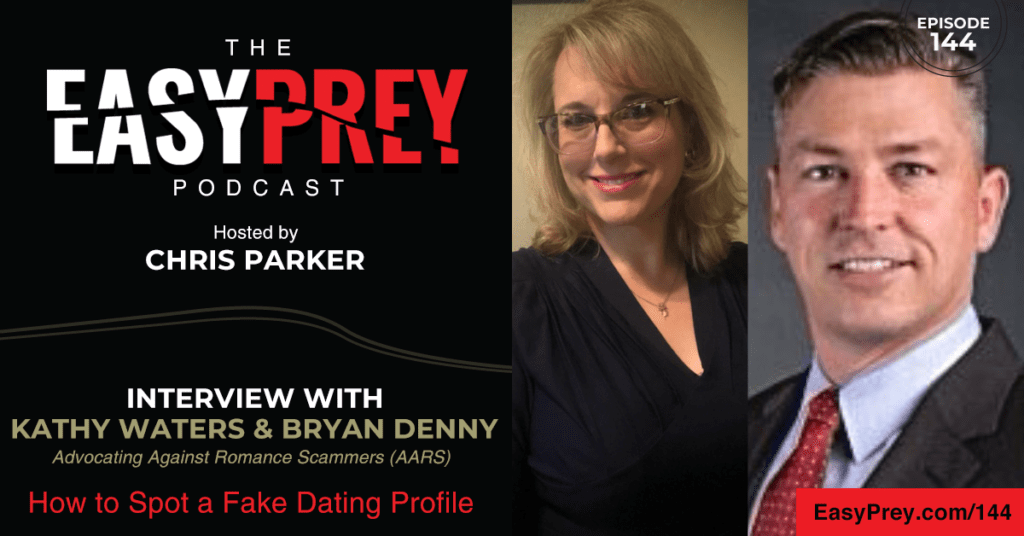
Online dating has become more complicated than ever. Learning how to verify that the person you’re talking to is actually the person in the dating profile can save you from heartbreak and financial loss.
Today’s guests are Kathy Waters and Bryan Denny. Kathy Waters is an expert advocate and an educator on the subject of online romance scams. Kathy is co-founder, along with retired Colonel Bryan Denny, of the non-profit organization Advocating Against Romance Scammers. Both have been working for safer platforms since 2016 with the same goals in mind: justice for victims and educating all online of the cybercrime known to tear people down emotionally, psychologically, and financially.
“We have been noticing that younger people are reaching out and reporting romance scams.” - Kathy Waters Share on XShow Notes:

- [1:18] – Bryan shares his experience with someone using his name and images in fake profiles.
- [3:00] – Kathy’s mother’s friend was a victim of a romance scam that used Bryan’s photos.
- [4:36] – AARS became a non-profit last year and works to educate not only users, but lawmakers, too.
- [6:01] – Dating profiles of someone in military uniform is a red flag.
- [7:41] – There are many red flags to look for and there will often be more than one indicator.
- [8:50] – Ask a friend in the military about an unusual profile or reach out to Kathy and Bryan.
- [10:23] – It’s tough to get people to report these interactions.
- [11:40] – Prior to Covid, the demographic was more elderly aged people. But a younger crowd has been affected since Covid.
- [13:22] – Younger people are more likely to come forward and talk about their experiences than an older demographic.
- [14:41] – It is also therapeutic to come forward and talk about it.
- [16:07] – Scammers tend to have a similar story, working out of the country.
- [17:51] – Bryan shares that he continues to receive messages about his photo circulating on fake profiles and the stories are all very similar.
- [20:07] – Bryan explains how scammers manipulate videos to pretend to be interacting on video calls.
- [22:23] – If you’re concerned about interacting with someone through video calls, you can ask them to do something like touch their head or look a certain way.
- [24:01] – What do you do if you know you are interacting with a scammer?
- [26:04] – Scammers share where they have had success with other scammers.
- [27:43] – If you are watching this happen to someone else, there are ways to approach it with them. Outsiders tend to see the red flags sooner.
- [28:54] – Unfortunately, they may not believe you. Try to educate them on red flags.
- [29:46] – There are support groups for helping manage the emotional toll this takes on a victim.
- [32:09] – What laws are in place for this?
- [33:19] – Scammers are typically in another country. They are hard to go after legally because they are not in the United States.
- [34:49] – On their website, there are commonly used photos in fake profiles and ways to report a scam.
Thanks for joining us on Easy Prey. Be sure to subscribe to our podcast on iTunes and leave a nice review.
Links and Resources:
- Podcast Web Page
- Facebook Page
- whatismyipaddress.com
- Easy Prey on Instagram
- Easy Prey on Twitter
- Easy Prey on LinkedIn
- Easy Prey on YouTube
- Easy Prey on Pinterest
- Advocating Against Romance Scammers (AARS) Website
Transcript:
Kathy and Bryan, thank you so much for coming on the Easy Prey Podcast today.
Kathy: Thank you for having us.
You're very welcome. Can you give myself and the audience a little background about how the two of you met and what you're currently doing?
Bryan: I'll start, Kathy. It started for me back in 2016. I was leaving the military and updating my LinkedIn profile. I quickly got a message from someone that said, “Hey, I'd like to talk to you.” I thought, “OK, this is good. It's about a job.” I very quickly realized it wasn't about a job. I provided my phone number because I was still pretty naive about things at the time.
She called and, “I think we've been having a conversation for a few weeks.” I said, “Nope, not me.” She said, “Well, let me send you some pictures.” She did. There were pictures of me that had been taken out of social media and a couple of official army photos that were pulled off the Internet. I said, “Yeah, this is me, but it's not me.” She said, “Well, I've got something else.”

She sent me a couple of plane tickets with my name on it and said I was flying in from Syria to spend a week with her in Montreal. It got creepy at that point. She said, “Go onto Facebook. Go to the search bar, and type your name in.” I did and there were double digits of fake profiles of me, same spelling of name, all my pictures, same pictures in most cases, and I immediately went to work trying to delete those and police set up.
I did that for several months, largely unsuccessful in getting Facebook to take the profiles down. A number of people had reached out to offer help. Kathy reached out and found me in November, and started a partnership there. I'll let Kathy talk through that.
Kathy: It was my mother's friend that was being scammed. She came over for Thanksgiving, showed us a picture of this guy. It was her new fiancé, and everything sounded too good to be true. I had heard that she was seeing somebody already because my mom saw the red flags. She was telling me about it.
I looked up his accounts. He was going under Ross Newton. I looked under the account and saw Bryan's picture in uniform. His name badge said Lennier Denny, so I looked him up. I put in army man Denny, and Bryan's LinkedIn came up. I reached out to Bryan at that time, and he responded back a few days later. He let me know that I could find his photos on Facebook, pretty much under any name with the last name Denny. He was right.
I went on, looked up all the different accounts and started documenting them. We ended up just noticing that nothing was being done about this, or a lot more needed to be done. We started documenting everything, like I said, did a report, and gave it to Facebook. We were able to get a couple of connections over there and met with them. They just sufficed us the whole time. We decided to go to the lawmakers from there and hopefully make some changes in this. That is the story in a nutshell.
And that's why you started to advocate against romance scam.
Kathy: Yeah. We became a nonprofit about a year-and-a-half ago. We know that we have to educate our lawmakers for this, too. We provide education and awareness, and we guide anybody who comes to us if they need to know where to report and if they need to know where to get some therapeutic help. We are not therapists so we can't provide that, but we can definitely guide them to the appropriate assistance.
That's great. Bryan, I wanted to ask you. We talked a little bit about this beforehand. Let's start at the beginning of a romance scam, what it looks like. I've often heard conventional wisdom of don't trust a dating profile of a man or woman in military uniform. Is there any from your experiences or any military regulations about it? Any truth to that?
Bryan: Certainly, I don't think it's punishable under any part of the universal code of military justice for having bad judgment. Certainly, if you're posting pictures of yourself in uniform on a dating site, that's probably not the smartest thing to do.

If you're talking to someone in a military uniform on a dating site, certainly there's been a lot of talk. That's what we try to do is educate people about the volume of people that are on these sites that are passing themselves off as a military person.
It should set up red flags if you're talking to somebody in uniform. It's made a habit of posting pictures of themselves in uniform. The indicators are there, and you should be suspicious off the bat if somebody's posted pictures of themselves in uniform on a dating site.
It's one of those, it's not a guarantee that the person is a scammer, but it's one of those big red checkmarks that we should be watching out for.
Bryan: Absolutely a red flag.
Let's go back and talk about some of the commonalities of these profiles in the dating platforms. Is there something that they do consistently in creating profiles and targeting particular individuals?
Kathy: A lot of the times the accounts when they are approached, they're brand new accounts. They were just formed within maybe a few months. They have just a couple of photos. Usually, their followers are all of the same sex. So if you got a guy that's trying to talk with you, he's going to have a bunch of women that's on his profile as friends or followers. Those are some key flags.
Like Bryan said, with the military uniform, you see people working on an oil rig. A lot of times, you can tell the photos are photoshopped. Like Bryan said, that is one big red flag, and you can't just go by one red flag, you do have to look into it further.
If you're noticing a couple of red flags there, this guy, the only comments he has on his pictures are women that are flirting or men that are flirting. You don't have time for that, so there are just too many there. I would say, two, three tops, if you're noticing that, move on.
Bryan: Another big indicator is broken English. The English will always be really well thought out or speaking in complete sentences. It helps if you have a military friend. They could just see, what's he talking about here? Most of the people who do this on both sides don't really have a military background.
It's easy for a guy that's been in service, or has been in service, to punch holes in their story and this thing. There are all kinds of indicators. You really just have to want to look for them and be suspect on it.
There are all kinds of indicators. You really just have to want to look for them and be suspect on it. -Bryan Denny Share on XKathy: And if these people don't have a friend that's in the military, or somebody to ask, that's me. I'm your friend. You can ask me. I have a great person to go to. I have no problem. Bryan will answer any questions that I have about the military and relatively fast, too. As soon as I see the message, I never want people to hesitate because they don't have a friend in the military or they're afraid to ask. That's why we're here. So I really encourage people to speak with us and message us.
Got it. Are the scammers often usually making the first move and reaching out to their targets? Or is it a little bit of back-and-forth?
Kathy: Oh, no. They're usually always the first one to reach out.
Bryan: Is the fish trying to jump in the boat? These guys are fishing. This is a business. They are actively throwing lines out there, continuously looking for nibble, looking for a bite, and then trying to set the hook there. The scammers are actively patrolling, actively looking. They've got a demographic they have in mind. They have an idea. More than an idea, a well-developed script in terms of how to quickly go from, “Hey, we just met and I need money,” but it is a very targeted and very organized engagement.
The scammers are actively patrolling, actively looking. They've got a demographic they have in mind. -Bryan Denny Share on XYou mentioned an ideal demographic. What is the ideal demographic? I guess let's be careful here. The ideal demographic of romance scams, where the victim will actually report it or, I can imagine some demographic is just going to…”Well, I didn't lose any money, or I'm just not going to report it.” Of those that are reported, what seems to be the ideal demographic?
Bryan: That's pretty tough. I'll say this, and then I’ll let Kathy go. It is really hard to get people, from my perspective, of any age to want to report this because it's been embarrassing whether they lost money or not. Sometimes, you'll chalk it up to experience. That's a tough one to answer.
I will say the demographic that we're probably most familiar with, is a demographic that's in late 60s-70s, someone who's maybe lost a loved one, is at a very vulnerable point in their life. In most cases, it starts off as someone looking for someone else to talk to, someone else to engage with.

That demographic has shifted a little bit over the last year-plus, I guess, to include a younger bracket, so the bandwidth has risen. But in terms of people, a demographic that's engaged in the reporting process, that's a bit harder for me to neck down on. Kathy, what are your thoughts?
Kathy: Bryan's exactly right. We saw more of an elderly population before COVID. When COVID hit, everybody was kept home. Everybody started to get lonely, as you know, and the only type of social interaction at that time was online. We're seeing a lot more of the younger crowd being affected.
We're seeing a lot more of the younger crowd being affected. -Kathy Waters Share on XAround the COVID time is when I started the TikTok. I didn't know how that was going to go because there's not a lot of older people there. But I thought, “Well, if the younger crowd would share that with their mothers or fathers, grandparents, anybody, then that's a win-win. If we can save one person or educate one person, great.”
But no, I've been noticing the people who are reaching out to me are the younger crowd. It's gone into the 20s, usually more 30s, I think, but it's pretty wild to see that it exceeded my expectations on TikTok, which is great. In TikTok, you can tag it under your For You page, and it can grab people who don't even know who you are.
It's regulated to a point—what people like and what they don't like—but I can't get to people who have never heard of this or never even thought to listen to it. It's a pretty amazing tool to have and to see what has come up the pipe from the COVID.
Maybe there have been a lot younger people over the years. They're just not coming forward. But they're comfortable to come forward because other people are speaking out too, which is good to see.

To me, I think that's one of the big things is one of the reasons why I had Debby Johnson on one of the earlier episodes, and she talked about one of the reasons why she talks about her experiences being a target of a romance scam.
She knew that, “If I don't say anything, then there's just less awareness of this problem.” As difficult as it was for her to start talking about it, that it really helped other people to be able to come forward and to get the help that they needed, knowing that they weren't alone.
Kathy: Oh, absolutely. That's exactly what they would feel like: they’re alone. They're embarrassed that they gave so much money away or any money, or it doesn't happen with money. It could be photos. People send promiscuous photos, and that's embarrassing in itself to say, “I did this.” But that is still part of the crime. It's part of their manipulation.
If they didn't send any money, and they sent photos, well, these scammers are going to be like, “I have your photos. If you don't send me money, I'm going to share it with your family, your friends, your co-workers.” They use every possible tactic that they can, so people are embarrassed and ashamed to come forward, and they really shouldn't be because they deserve their justice just as much as anybody else does, whether they gave a dime or not.
They use every possible tactic that they can, so people are embarrassed and ashamed to come forward. -Kathy Waters Share on X
Bryan: I think it's therapeutic. You have to convince people that they are better off letting this go and talking about it and then trying to bury it.
I think that's one of the challenges to get people talking about. I was curious about the younger people that you had corresponded with on TikTok. Were any of them surprised that they were targeted? Like, “Gee, I only thought they targeted my grandparents”?
Kathy: Oh, yeah. I would say almost every message that I get from them, they all say, “I never thought this would happen to me. I can't believe this happened. I can't believe I was so dumb that I would fall for this,” because they've heard of it.
It's not going to happen to them, their age. They know what's going on in the tech world today, so they let their walls down. Like I said, it's not going to happen to them. So yeah, absolutely. Probably every message, they can't believe that it actually did happen.

I think about the interactions between the scammer and their target. We talked about broken English. To me, it's always after three conversations, the other person totally loves you. But what are some of the other warning signs that you're dealing with not a real person looking for a relationship but a scammer?
Kathy: They'll either ask for gift cards, money, usually early on. A lot of them have a similar story. They're all there, they're deployed, they work out of the country, and that just sets up more ability to fabricate their story. They want to send a package to you. It's all of their belongings, then that package gets stuck in customs and they need money to send so you send more money.
But a lot like the early-on red flags are a lot of the love-bombing. They love you right away. They're calling you dear, babe, and queen, almost immediately. They ask questions about where you're from, what you do, your work, things like that.
Everybody, I guess, in a normal relationship, you're going to want to know what's going on. But they dive in deep, sometimes pretty quick, like about being a homeowner or any property you own. Anything like that you should not share, of course, in the matter of 10 minutes of your conversation with somebody.
Bryan: But time is money, and they hate that. If they're fishing with a hundred different people here, they've got to figure out who is worth continuing to engage. They've got to make some decisions. They may throw a hundred lines out. They may get 20 people to respond. Of those 20, two or three may actually give something. So they've got to quickly sort out who those two or three are that are going to give something.
For me, I get messages almost on a daily basis in my messenger from people I don't know. It's almost always the same. I'm talking to you, you're on some humanitarian mission in the Middle East and your son is in a boarding school back in the States, and now he's been hurt in a horse riding accident, and I need money to help provide medical coverage for him.
You can spin that yarn with he's got a picture of me in a uniform, a picture of me and my son, and then a picture of us with the horses. That's a good and compelling story to be combined with animals. Of course, I'm a widower at this point. It's easy to spin somebody up on that.
People want to do a good, a soldier that's deployed, and say, “Hey, I'm going to help this guy out and give him money to help his son get the medical attention he needs.” He may love me and this may go into something further. I've seen that time and time again over the last few years. That story just doesn't get old, but it's just a story that has made scammers money and getting used.
Yeah, it's something they found that works and they stick with what works.
Bryan: That's right.
Early on when I started the podcast, the conventional wisdom was if the person refuses to go into video chat, then that's a really good indicator that they're a scammer. That probably is true that if they refuse to do it, they're probably a scammer. But it sounds like from talking before, things have changed in terms of just because they are willing to go on a video isn't enough now. Can you elaborate and talk about that issue?
Bryan: We certainly have seen videos that we have done and posted in trying to warn people about scammers that they have been used, slowed up, sped down, voiced over to simulate a Skype or Zoom call with someone, and you can always play off the bad connections, the slow internet speeds, which sometimes affects normal day-to-day life and activities.
This is an excuse to, “Oh, the lighting’s bad.” Particularly with someone that's deployed in a remote location, they don’t have the best of internet connections. Or, “I'm doing something that is secretive. I'm at a military base, and I can't share this information with you.” There are 101 ways to create a “This is why I can’t share this data with you.”
You've got to be suspicious of that. If you're not wondering why this person is intentionally not sharing data they quite possibly could share with me, there's a reason for that. They don't want you to know what they're really doing.
I figured at some point, that would become the case. It's funny, because it does work really well with the overseas narrative. “I'm at a hotel, has bad WiFi. I don't have good cell coverage. The secret mission.”
Bryan: “We’re at the operating base, and we don't have the ability. We've got great coverage, we're here, but I'm not allowed to send you this. My chain of command says we were not allowed to have this contact because of the sensitivity of our mission.” There are 101 excuses now that you could do it, but you can't because your job won't allow you to do it. You really want to, but you can't. It's a secret, or you can't actually know who I am because of the sensitive work that I do. Those people will buy that.
Kathy: These scammers will go on the real accounts of the guy, recorded video that they have put onto their site—could be a TikTok, could be on their Facebook or Instagram—and they record it. Then they show it to the person they're talking to. They record on their phone and they'll show it to the person off their computer and play it so and then, but they've already edited it usually, too. That's how they get away with it.

I've also heard that if the person's watching the victim and they say, “Oh, turn your head to the right, or turn your head to the left, or do some movement.” Of course, they'll make some excuse. But that's another way that you can try and confirm, too, because they're not going to be able to do that. They can only do of course what the video is showing.
But if you can say, “Oh, during the video, can you touch your head?” Or, “Can you turn your head to the right or to the left?” They can’t. They won't do that, because that's not what's on the video.
It's so hard because you have to be able to work around all of that. There are even things on YouTube on how to do it from the scammers of how to create these fake videos. It's mind blowing what's out there.
It's a business for them, so they come up with instructions on how to run their business effectively, which is a scary thought.
Kathy: And it's public for everybody to see, which is pretty crazy.
That's amazing. If someone has gotten “in a relationship” where they're corresponding with someone and they finally are like, “OK, I think I feel confident that this person is a scammer,” what should they do at that point?
Kathy: Stop all communication. Don't keep talking to them at all. That's probably the hardest for them. It's like a drug. It actually affects the brain, like an addiction. The best thing is you stop communicating. I would screenshot all pertinent information that has to do with any scam, blackmailing, asking for money, that kind of thing.
Report them to the ic3.gov, which is the FBI cybercrime unit, and block them. You'll want to block them, gather as much information, keep it in a file folder on your computer. A lot of times, people just want to forget about it, because they're embarrassed and they want to delete it. Don't delete anything. When you report to the IC3, you're not going to get a call back in the next day or two, or week, or month. So, you know, just hold onto that stuff.
If your case is not big enough, they can put it with another case that could open a bunch of doors for you to get your own justice, too. But if you delete everything on your end, it's gone. Your proof is gone. They always like to move the conversations—the scammers do—when they meet you on Facebook or Instagram to an encrypted messenger site, like WhatsApp and Hangouts.
They're going to delete everything on their end if they think that they are in some legal trouble. It's almost impossible for law enforcement to find their communication from their computer once it's deleted. So you want to screenshot and save everything you possibly can.
Got it. I know with other scams, once a person has been targeted and becomes a victim, the scammers will often share a hot list of, “Hey, we've done our scam. We’ll sell you this list and you can go after it with your scam.” Should they be not just blocking that person? But should they delete, make their profiles not public, knowing that other scammers are likely to target them as a result of the previous scam?
Bryan: Certainly. Not having a public profile is a good idea. I think scammers share information on how to get things done, from the scripts, to how to get the ID cards, to everything else that's involved in this kind of thing. I certainly believe that scammers share where they've had success, and if they've been able to successfully manipulate someone out of money, then that information is shared as well, so as to make it public to the rest of the people in this business.
I certainly believe that scammers share where they've had success, and if they've been able to successfully manipulate someone. -Bryan Denny Share on XKathy: And I always tell the victims, too, just because you're blocking this person, not only are they going to have more accounts to try and approach you under, they're going to sell your information. Other people are going to try and befriend you. Do not accept any friend request from anybody that you don't know in person.
Unfortunately, it's just how the cookie crumbles with social media nowadays. It's unfortunate because we should be able to make friends or link up with people who have similar interests. But we just can't do this, especially when you've been contacted and been responding to a scammer. This is just their way of trying to get more money out of you. So if you fall for it once, they feel you're going to try or you may fall for it again.
Got it. If we have a friend or relative, the way they're talking about their online love interest, if we think that that might be a scam, are there questions that we should be asking them? What should we be doing to help those that they don't think that they're in trouble, but we think that they are?
Kathy: Usually the person who's victimized is usually very excited to tell their story because it's a new love. They're going to be spewing about their new love interest, and you or the person on the outside is usually going to see all the red flags popping up, which is exactly what I did with my mom's friend.
You can put a bug in their ear a little bit like, “Well, this sounds too good to be true. I know these are some of the red flags of a scammer. Why don't you try asking them certain questions.” Like with the military and stuff, you can ask certain questions.
Bryan, what’s the army postal office address?
Bryan: APO. Army Postal Office.
Kathy: They all have that. They can give it out. But of course, they don't have one, right? The scammers don't have one. So they try to say that, “Oh, that's confidential.” It is not confidential. I tried too if there's an excuse with it, that's definitely a red flag too. I would subtly start telling my friend or my loved one, “This sounds like a red flag. You may want to go and do some investigation on it.” Then let them know some more of the red flags.
Unfortunately, on a lot of these scams, the manipulation is already deep enough to where they're not going to believe you. Even their closest loved ones, they're not going to believe them, and that they're going to be the bad guy. Sometimes they just have to figure it out on their own, unfortunately. By providing the information, that's really the most you can do.
It's different situations. You've got children that are watching their parents do this. Sometimes they're on their bank accounts, and they can close the account. There are different things like that, too, that you can do, but for the most part, definitely help educate them.

Got it. Once someone has realized that they're, “OK, I've been scammed,” or, “I'm about to be scammed,” what resources are available for people in that situation? Let's also talk about some of the emotional relational challenges that they're going to have to deal with.
Kathy: Cybercrime support network is out there, and they actually have a support group that you can go to. Definitely, I always say report your crime. You can always reach out to the FBI and talk with a victim specialist. They're always there to help you to recognize the flags or tell you what you need to do. You'll definitely want to go to your banks to explain what happened. So they can put at least a little note in your file of what happened just in case any funny business starts happening within your accounts.
There are tons of information out there. Unfortunately, there's not a lot of clinical help out there that is just based on romance scams. I always think the best help to go to is like a marriage family therapist to search for and make sure that they are licensed, but as I said, they can always go to our website. We have tons of information on there, and you reach out to us and we can definitely try and find the best type of help that they would need.
Bryan: That’s just really the unfortunate part because it is financially destructive as this whole thing can be to someone, particularly maybe a portion of their life when they may be on a fixed income, and they don't have a lot of resources. That's tough to recover from, just as difficult is the emotional damage that's been done and trying to recover from that.
I tend to believe people that are emotionally vulnerable are targeted, and are the people that become victims in this. It's almost like you're kicking someone when they're down. This is a really insidious way to go about doing it in a very hurtful way. That's a metric that's really hard to evaluate, hard to measure. But a significant number of people that walked away from this, even if they haven't been financially hurt, but just emotionally devastated and that's hard to recover from.
Are there things that need to be done on the platform level or the legislative level that you think can help reduce or somewhat mitigate romance scams?
Kathy: There's a law in place right now. It says section 230 of the CDA, which is the Communications Decency Act. This is a law that's in place that keeps social media platforms from being responsible for any third-party posts. That's any crime, not just romance scams. So that law definitely needs to be amended.
We do go to talk to lawmakers. We go to educate them on this information, especially their constituents, how many have been affected, how much money they've lost, and just hope for the best that they will come to us and hopefully get more information on it and education and want to make some bills to make things safer.
But for right now, because of that section 230, it's very hard to get anybody responsible for anything. So the scammers still run them up on social media platforms. So yeah, absolutely. Things need to be done legally.
There's some of the challenge that a scammer is not your next door neighbor, but very likely someone overseas and all of a sudden, you have jurisdictional issues and law enforcement agencies and other countries that may not have the resources, time, or interest in pursuing these things.
Kathy: Yeah, and that's why we did this. That's why we are educating our lawmakers, because it is significantly harder to go after the scammers. Law enforcement does their thing. They gather as much information that they can. But for us to be able to make some movement, we have to do it right here in the United States where we're at.

To know that these platforms are allowed to post criminal activity without being responsible or accountable for this, that's huge to me. Anybody else living in the real world, you commit a crime, you're accountable for that, and why social media is not after all these years. That law is about 25 years old. So yeah, this is just the way that we've decided to go.
Of course, we back law enforcement at 100% because they're the ones that are bringing these guys back to the United States to try them, and there have been several trials too. That's great, but as long as we keep pushing that word out there and educating, hopefully we can get some lasting change. That would be fantastic to see.
Awesome. If people want to learn more about your organization, help out, donate, where can they find more about your organization?
Kathy: They can go to our website, advocatingforu.com. Definitely go there. We've got red flags. We’ve got how to stay safe. We’ve got photos you can look at, like very popular photos that people have used, or the scammers have used. They're all innocent victims as well. Where to report. Yeah, we've got a ton of information there.
Great. Kathy and Bryan, thank you so much for coming on the Easy Prey Podcast today.
Kathy: Absolutely. Thank you, Chris, for having us.
Bryan: Thanks so much, Chris. We appreciate it.


At the moment Iam talking to military guy name John but say he Bryan .he say he in Syria and can’t get home due to no internet for his band .so he ask for me to sent money .